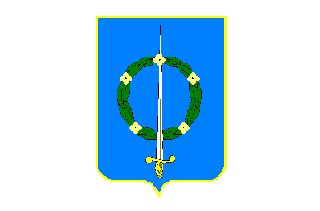
Last modified: 2007-06-09 by antónio martins
Keywords: tzar | royal flag | aleksandrina | moscow | eagle: double headed (black) | sword | wreath | shield | ivan 4 “the terrible” (russia) | star: 8 points | stars: 5 (8 points) | crosses: 2 | cross: coupe |
Links: FOTW homepage |
search |
disclaimer and copyright |
write us |
mirrors

This is the personal Standard of the Tsar.
Jaume Ollé, 21 Jul 1998
Golden flag with black coat of arms with
4 scrolls: Vessel standard (1699-1917)
Željko Heimer, 03 Apr 1999, quoting from
Flag-znamya korablya,
Russian Navy website, consulted 07 Mar 1999
Only one Emperor’s Standard (yellow with black eagle with maps in his
claws) existed in times of Catherine the Great. She used it.
Kostroma (city on Volga River) have the arms:
«Azure, a ship of Catherine the Great with Emperor’s Standard on
main-mast».
Victor Lomantsov, 02 Jun 2000

Broad-pennant of Emperor — swallow-tailed,
emperor’s standard at the
hoist, white at the fly.
Victor Lomantsov, 30 May 2000

This is the Russian Emperor Standard. It should had been
adopted toward 1858 and this is the version used ashore.
Mario Fabretto, 17 Jul 1998

The Tsar’s standard afloat is the same as
ashore but with red
background.
Jaume Ollé, 21 Jul 1998

The Tsar’s standard in Moscow
is the same as the normal one but
white, blue, red horizontal stripes background.
Jaume Ollé, 21 Jul 1998
I’m not so sure it is the one. The eagle should be yellow
and not black with maps (“naval version”).
Russian tricolour with golden coat of arms allover:
The first vessel standard "Moscow Tsar Flag" (1693-1699).
Željko Heimer, 03 Apr 1999, summarizing from
Flag-znamya korablya,
Russian Navy website, consulted 07 Mar 1999
Symbolism of Andreevsky Flag
was also Peter’s contribution to his father — tsar Alexei
Mikhailovich who instituted the special flag - dark red
two-headed eagle on white-blue-red cloth — for the first
military Russian vessel — three-mast galiot Eagle.
Edward Mooney, 14 Mar 1999, quoting from
Russian
Navy website
In one of the worlds first flagbooks, compiled by Carel Allard (from Amsterdam) in 1695 [ala95], shows three Russian flags:

Also exists a Tsar Standard (and pennant)
for his rural house of Alexandrina: white with emblem (white bordered
black shield, vertical sword, ring of wreath).
Jaume Ollé, 21 Jul 1998
Flag for “The Alexandria”, a personal summer-cottage of
Emperor. White flag with arms: Azure, a Sword in pale Argent hilted Or
and decored with a round Wreath of flowers and leaves.
Victor Lomantsov, 20 Jul 2000

Broad-pennant for “The Alexandria”, a personal
summer-cottage of Emperor. The same design
but swallow-tailed and long.
Victor Lomantsov, 20 Jul 2000

I have book called The Cultural Atlas of Russia which shows a
flag of Ivan VI which is called the flag at Kazan.
Steve Stringfellow, 23 and 27 Aug 1999
It is a dark top heavy trapezoid, with the refered icon painted on the
hoist part and a roughly regular arrangement of light five stars and two
couped crosses on the tappering fly. As said, the now faded colors are
disputed (it is a black-and-white photo).
António Martins, 21 Jan 2003
This flag is totally different than the one in Smith’s 1975 big book
[smi75c]. So, the question is: what flag
did Ivan IV have?
Steve Stringfellow, 23 and 27 Aug 1999
I confess that I have no idea: Ivan the terrible was the first
Muscovy prince to use the title of Tsar
(from latin "CAESAR", in russian "carh |
царь"), after
geting rid of Mongol / Tatar domination
and having submitted to his own personal power the other russian princes
(Tver, Kiev,
Novgorod, etc.) — hence «Tsar
of all Russias». This happend in a historical period
when heraldry wasn’t yet really set in Russia (it come somewhat
later, after italian, german and french
influences), and I guess that Ivan’s flag would have much more to do
with mongol Khan’s regalia, than to the usual symbols of a westerner
monarch. This image seems to confirm it.
António Martins, 24 Aug 1999
Ivan IV, the Terrible (1530-1584), often considered as the founder of the
modern Russian Empire. He was the first to adopt the title of czar (from
Latin Caesar, since Moscow was supposed to be the third Rome —
replacing Rome and Byzance) and increased the Russian territory by conquering
the khanates of Kazan and
Astrakhan.
Ivan Sache, 01 Oct 2000
Anything below this line was not added by the editor of this page.